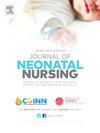The future of NICU Care: Prioritising infant mental health
Q2 Nursing
引用次数: 0
Abstract
Over recent decades, advancements in neonatal medicine and technology have significantly improved survival rates for high-risk neonates. Day to day care of infants tends to focus on physical health, and infant mental health is often overlooked. Infant mental health (IMH) is increasingly recognised as integral to neonatal outcomes. It is defined as the social, emotional, and cognitive well-being of infants within caregiving relationships.
The Neonatal Intensive Care Unit (NICU) experience can be a source of stress and trauma for both neonates and their families, impacting developmental and long term health outcomes. Integrating IMH into NICU care encourages both staff and parents to view neonates as individuals with emotions and sensory experiences. This can help, foster connections promotes healthy development. IMH Intergrating IMH into daily care faces challenges such as limited awareness, resource constraints, and the dominance of task-oriented care models. This highlights the need for collaboration among multidisciplinary teams and a new approach in caring for these vulnerable infants.
Family Integrated Care (FiCare) offers a promising framework to address these gaps. By empowering parents as active participants in their baby's care and fostering interdisciplinary collaboration, NICUs teams can balance medical advancements with holistic, family-centred approaches and reduce toxic stress. Training NICU staff, developing IMH protocols, and providing parent education are critical to building IMH competency.
A paradigm shift is needed to prioritise the mental health of neonates alongside their physical care. By placing families at the centre of care and embracing FiCare and IMH principles, NICUs can enhance developmental outcomes, reduce hospitalisation durations, and strengthen parent-child attachments, ensuring that neonates not only survive but thrive.
新生儿重症监护室护理的未来:优先考虑婴儿心理健康
近几十年来,新生儿医学和技术的进步显著提高了高危新生儿的存活率。婴儿的日常护理往往侧重于身体健康,而婴儿的心理健康往往被忽视。婴儿心理健康(IMH)越来越被认为是新生儿结局的组成部分。它被定义为在照料关系中婴儿的社会、情感和认知健康。新生儿重症监护病房(NICU)的经历可能是新生儿及其家庭压力和创伤的来源,影响发育和长期健康结果。将IMH纳入新生儿重症监护病房,鼓励工作人员和家长将新生儿视为具有情感和感官体验的个体。这有助于培养联系促进健康发展。将IMH整合到日常护理中面临着诸如意识有限、资源限制和任务导向型护理模式主导等挑战。这突出表明需要多学科团队之间的合作,并采取新的方法来照顾这些易受伤害的婴儿。家庭综合护理(FiCare)为解决这些差距提供了一个有希望的框架。通过使父母积极参与婴儿护理和促进跨学科合作,新生儿重症监护室团队可以平衡医疗进步和以家庭为中心的整体方法,并减少有毒压力。培训新生儿重症监护室工作人员,制定IMH协议,并提供家长教育是建立IMH能力的关键。需要转变思维模式,将新生儿的心理健康与身体护理放在首位。新生儿重症监护室将家庭置于护理的中心,并采用FiCare和IMH原则,可以改善发育结果,缩短住院时间,加强亲子依恋,确保新生儿不仅存活,而且茁壮成长。
本文章由计算机程序翻译,如有差异,请以英文原文为准。
求助全文
约1分钟内获得全文
求助全文
来源期刊

Journal of Neonatal Nursing
Nursing-Pediatrics
CiteScore
2.00
自引率
0.00%
发文量
143
期刊介绍:
Aims & Scope: This is the practical, bimonthly, research-based journal for all professionals concerned with the care of neonates and their families, both in hospital and the community. It aims to support the development of the essential practice, management, education and health promotion skills required by these professionals. The JNN will provide a forum for the exchange of ideas and information between the range of professionals working in this field; promote cooperation between these professionals; facilitate partnership care with families; provide information and informed opinion; promote innovation and change in the care of neonates and their families; and provide an education resource for this important rapidly developing field.
 求助内容:
求助内容: 应助结果提醒方式:
应助结果提醒方式:


